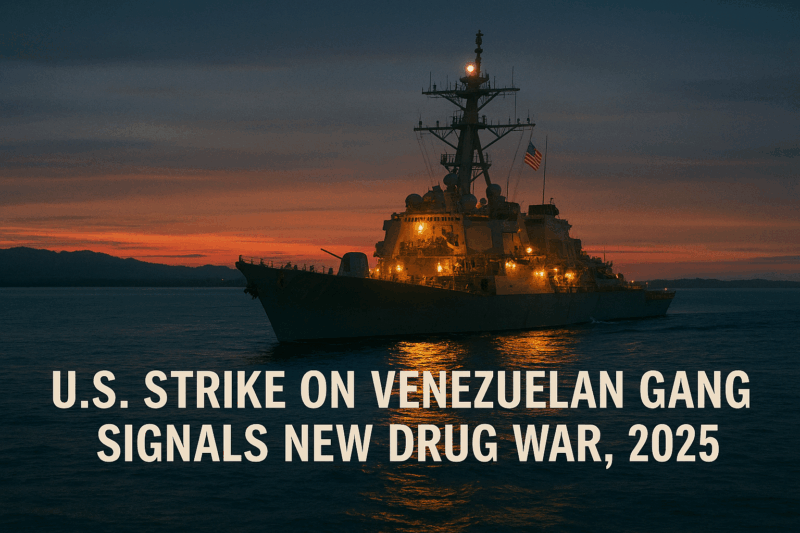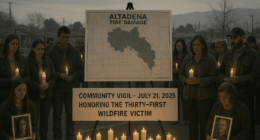A Bold Strike in the Caribbean
On September 3, 2025, a U.S. military strike obliterated a speedboat in the southern Caribbean, killing 11 alleged members of the Venezuelan gang Tren de Aragua. The vessel, carrying what President Donald Trump described as “massive amounts of drugs,” was targeted in international waters, marking a dramatic escalation in the U.S. fight against Latin American cartels. The operation, conducted under Trump’s orders, sent shockwaves through the region, with the president warning that such actions would deter future drug trafficking attempts. This unprecedented move raises questions about the future of U.S. drug policy and its impact on Latin American relations.
Human Toll of the Strike
The strike claimed 11 lives, identified by the Trump administration as Tren de Aragua members, though no public evidence confirms their identities or cargo. The operation, executed by a Special Operations aircraft—likely an attack helicopter or MQ-9 Reaper drone—left no survivors. Families of the deceased, if connected to the gang, now face the loss of loved ones entangled in Venezuela’s complex web of crime and economic hardship. The broader human impact extends to communities in Venezuela, where poverty drives many into illicit activities, and to U.S. cities plagued by the drug trade, particularly fentanyl, which Trump blames on groups like Tren de Aragua.
Facts and Figures
The U.S. military strike occurred on September 2, 2025, targeting a four-engine speedboat in international waters, as confirmed by a senior U.S. official. The operation followed weeks of surveillance by U.S. aircraft and sensors tracking cartel maritime traffic. President Trump claimed the boat was transporting drugs bound for the U.S., though specifics about the type or quantity remain undisclosed. The U.S. has deployed seven warships, one nuclear-powered submarine, and over 4,500 sailors and Marines to the region, signaling a robust naval buildup. In response, Venezuelan President Nicolás Maduro deployed troops along the coast and urged civilians to join militias, escalating tensions.
Broader Context of the Drug War
This strike reflects a shift in U.S. policy, with Trump designating Tren de Aragua and other groups like Mexico’s Sinaloa Cartel as foreign terrorist organizations in February 2025. Unlike traditional interdiction efforts, which focus on capturing traffickers, this lethal approach aims to deter through force. However, experts like Jeremy McDermott from InSight Crime note that Tren de Aragua has limited involvement in transnational drug smuggling, often acting as subcontractors for larger cartels like the Cartel de los Soles, which U.S. officials allege is led by Maduro. The U.S.’s aggressive stance, including a $50 million bounty on Maduro, risks destabilizing the region, recalling Cold War-era interventions in Guatemala and Chile. Critics, including international law expert Mary Ellen O’Connell, question the strike’s legality, arguing it violates rules against killing outside active hostilities.
What Lies Ahead: A New Security Paradigm?
The U.S. strike signals a willingness to use military force in the Western Hemisphere, a departure from decades of law enforcement-led drug interdiction. Secretary of State Marco Rubio warned that such operations “will happen again,” while Defense Secretary Pete Hegseth called Maduro a “kingpin of a drug narco-state.” The U.S. has pressed Mexico for cooperation, threatening similar actions on Mexican soil. For Latin America, this could strain diplomatic ties, with Mexico’s Foreign Secretary emphasizing respect for sovereignty. Long-term solutions may require addressing root causes like poverty in Venezuela, alongside international cooperation to curb drug flows without escalating to military conflict.
Legal and Ethical Concerns
International law experts, such as Mary Ellen O’Connell, argue the strike may be unlawful, as no immediate threat justified lethal force in international waters. The lack of transparent evidence linking the boat to Tren de Aragua fuels skepticism, with Venezuela’s Communications Minister suggesting the strike video may be AI-generated.
Conclusion: A Warning to Cartels Amid Rising Tensions
The U.S. strike on a Venezuelan gang marks a bold, controversial step in the fight against Latin American cartels. By targeting alleged Tren de Aragua members, President Trump aims to deter drug trafficking, but the operation raises legal and diplomatic concerns. As Venezuela mobilizes in response and the U.S. flexes its military might, the region braces for potential escalation. Addressing the drug trade’s root causes—poverty, corruption, and demand—remains critical to prevent further loss of life and ensure stability in the Americas.






